Catechetical Ministry
The Catechetical Ministry
Every Christian, a Catechist
It might be said that the first disciples of Jesus Christ were the first catechists, and thus began the catechetical ministry of the Church.
The Catechism of the Catholic Church in its Prologue states that God “calls man to seek him, to know him, to love him with all his strength.” (CCC 1).
It continues, “So that this call should resound throughout the world, Christ sent forth the apostles he had chosen, commissioning them to proclaim the gospel: ‘Go therefore and make disciples of all nations, baptizing them in the name of the Father and of the Son and of the Holy Spirit, teaching them to observe all that I have commanded you; and lo, I am with you always, to the close of the age.” Strengthened by this mission, the apostles “went forth and preached everywhere, while the Lord worked with them and confirmed the message by the signs that attended it.”
Thus catechesis is continued to this day by modern versions of Christ’s disciples, every Christian, who carries out, the teaching of the Christian doctrine so that those who hear and understand it may be brought to the fullness of life that God promised
A well-planned and organized ministry will then:
- raise the quality of existing catechetical work, especially of the catechists-formation programs;
- improve coordination of catechetical work with other pastoral ministries of parish and diocese;
- establish better lines of communication and sharing of new materials, etc. within the catechetical ministry itself. (cf. Rev. NCDP 452)
LEVELS OF THE MINISTRY
A. BASE-LEVEL ECCLESIAL COMMUNITIES
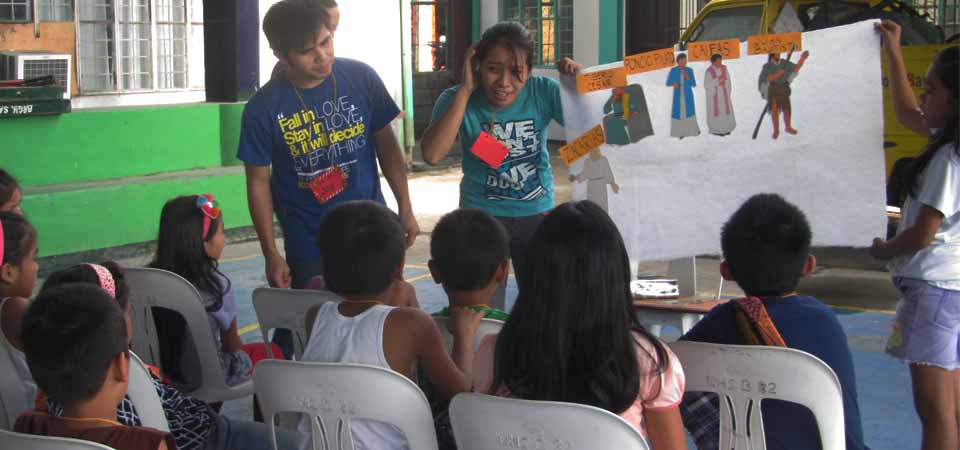
“Base-level ecclesial communities, arising from those who “want to live the life of the Church with greater favor” (EN 58c; GDC 263), offer the best opportunity to involve all Filipino Catholics in the catechetical ministry. In so doing, not only do the BECs’ members perceive the specifically ecclesial nature of their own community – as distinct from merely a sociological grouping – but they help one another’s faith become “living, conscious and active through the light of instruction” (Vat II, CD14), moving from merely being catechized to catechizing members – usually by working especially through family catechesis. Catechizing on this immediate, grass-roots level should, if properly developed, foster inculturation of the catechetical ministry by creative use of local customs, symbols, traditions and popular religiosity.” (cf. Rev. NCDP, 462)
Parents. This grass-roots level clearly focuses attention on the challenging vocation of Christian parents to catechize their own children. “Parents are the primary educators in the faith. Together with them, all members of the family play an active part in the education of the younger members.” (GDC, 255) Indeed, “family catechesis precedes… accompanies and enriches all catechesis.” (GDC 226; CT 68) In a family-centered culture such as the Philippines, the following directives of the John Paul II are especially pertinent: “The family’s catechetical activity has a special character which is in a sense irreplaceable… Education in the faith by parents… should begin from the children’s tenderest age… is more incisive when in the course of family events (reception of the sacraments, great liturgical feasts, the birth of a child, a bereavement), care is taken to explain in the home the Christian or religious content of these events” (CT 68). Filipino parents must be encouraged and helped in practical ways to carry out this mandate, especially through BEC activities and agencies engaged in family catechesis. (cf. Rev. NCDP, 464)
B. PUBLIC SCHOOLS
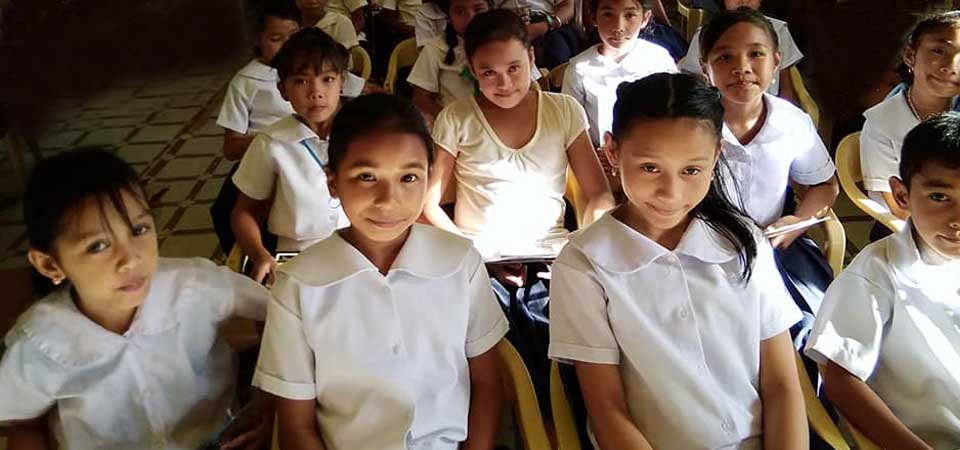
Public schools in the Philippines pose an even greater challenge for the catechetical ministry since with the rising population, a greater percentage of Filipino Catholic children will be public school students. Naturally speaking the Church has an overwhelming task in this apostolate. Great emphasis must be placed on efforts to train public school teachers who can help in the basic catechesis for their students, integrating Gospel attitudes and values with their academic subjects. While recognizing and encouraging the generous work done by various student organizations such as SCA, YMC, CCD, and the catechetical work of Catholic school student volunteer catechists (SVC), new initiatives in Christian witness and service, and new modes of presence in public schools on the part of religion educators, are called for – both on the personal as well as on the organizational – structural levels. (cf. Rev. NCDP, 485)
A system of professionally-trained catechists, leading groups of volunteer catechists, can reach more public school children. Forming core groups of students to activate and inspire their fellow students, particularly in regard to recollections, retreats and social service activities, has also proven very effective. This work by diocesan and parish teams needs the active, continuing support of parish priests and bishops. (cf. Rev. NCDP, 486)
Most important in this youth catechetical work in the public schools is the developing of: (1) practical, concrete coordination of actual public school catechetical teams, through the local diocesan catechetical office; 2) the professional formation of the catechists by continuing in-service training; and (3) the gradual formation of a basic syllabus that prepares public school children not only for first communion and confession, but also for continuing education in the faith as well.
With our present resources these steps are often scarcely possible; but this makes all the more urgent the training of more catechists, and the development of family catechesis in which parents and older children can effectively catechize the younger children. (cf. Rev. NCDP, 487)
C. THE PARISH
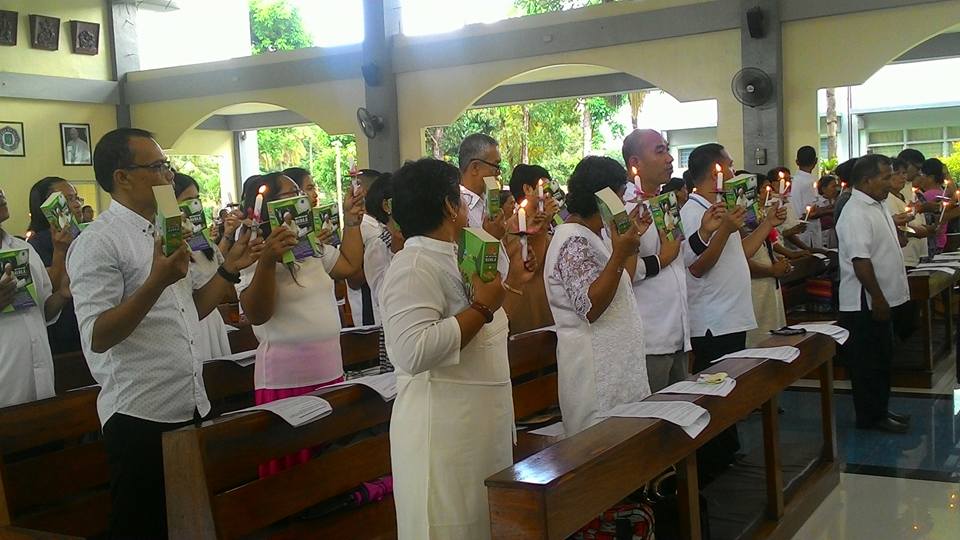
“The parish is without doubt, the most important locus in which the Christian community is formed and expressed… It constitutes a community space for the realization of the ministry of the Word at once as teaching, education and life experience.” (GDC 257) Today Philippine parishes are undergoing profound transformation due to the social changes. (cf. chap. 1) Most parishes in the Philippines are faced with the same basic problems: a lack of trained, competent catechists; the need of a well-defined, feasible and relevant catechetical program, and resources and supports required to put it into practice; the ever-present financial problems; and the means of coordinating the catechetical program with other parish “faith-formation” ministries. Greater collaboration with other parishes and with the diocesan center is also called for, especially in the training of catechists and in formulating better long-range catechetical goals. (cf. Rev. NCDP, 465)
The most practical goal for all parishes at present, is a renewed understanding and appreciation of the importance and centrality of the catechetical ministry itself, both for the life of the parish as a community, as well as for the faith-life of each member. John Paul II expressed this strongly: “The world needs catechesis. For the most — confused and restless as it is — is to form Christians sure about essentials and humbly joyful in their faith. Catechesis does this.” Appreciating the importance of catechesis must be translated into practical action touching every member of the parish, namely, those baptized and confirmed who hear the Word of God proclaimed and receive the Eucharistic bread in the community sacrificial meal at the table of the Lord and who are “sent,” in apostolic mission, to give witness to their faith in Christ before others. (cf. CT 67; Rev. NCDP, 466)
The parish priest. He is the key source for the parish catechetical ministry. With his parish catechetical leaders and coordinator, the parish priest:
- fosters a sense of common responsibility for catechesis in the parish, a task which involves all;
- cares for the basic orientation of catechesis and its planning by identifying the concrete needs of the parish, and drawing up specific objectives and priorities in responding to these needs;
- promotes vocations and recruits competent personnel for the service of catechesis, and enlists others in generating needed funds for the parish catechetical program;
- personally supports and encourages the on-going program by providing liturgical celebrations where needed, and working together with parish councilors, coordinators and parents in the catechetical apostolate;
- helps in periodic critical evaluation of the parish program with a view toward instigating needed changes and revisions;
- through his homilies, his talks, home visitation and sacramental ministry, the parish priest shows in deed as much as in word the “catechetical experience” of witnessing to life-in-Christ.
In brief, the parish priest is the key animating source for parish catechesis, and its central link with the neighboring parishes’ catechesis and the diocesan pastoral programs. (cf. GDC 225; Rev. NCDP, 467)
Catechists. To the catechist belong the greatest part of actually realizing the catechetical programs of BECs, parishes and schools. Upon them, with their basic Filipino human and Christian qualities, more than on mere methods and materials, depend the success and fruitfulness of the catechesis. Being a catechist means:
- responding to the call to be “witnesses to the Gospel,” “fellow-workers for truth in the Lord”; a mediator between the catechized and the mystery of God (GDC 156);
- teaching the Faith through the pillars of the Christian Message (Creed, Commandments, Liturgy) (GDC 240)
- fulfilling this prophetic and missionary vocation, in communion with, and under the guidance of the pastor;
- animating “a profound familiarity with Christ and the Father, in the Spirit” (GDC 235) in catechizing adults, youth, children, not only by instruction and good moral witness, but especially by sharing the joy, love, and enthusiasm that comes from this ever-deepening relationship with Christ in prayer;
- thus manifesting that fidelity to God and to man which is indicative of authentic commitment to the Church, in loving service of the community. (cf. GDC 156)
Considered “among the most faithful and hard-working servants of the Lord and of the Church in the Philippines” lay catechists take the lion’s share of catechizing in the public schools and in the parishes. (PCP II 647) Their number is far too few for the children, youth and adults that need catechesis. (•Go to NATIONAL SURVEY ON THE CATECHETICAL SITUATION IN THE PASTORAL SETTING)
The catechists are grouped as full time and volunteer according to the number of hours they render in the catechetical ministry. As far training and preparation are concerned, very few even full-time catechists are professionally trained, with adequate academic training of at least two years. Instead the great number of catechists all over the country are volunteers, and inadequately trained, that is, with specific training for the catechetical apostolate limited to courses from several weeks or week-end courses to one year. (Figures shown in NATIONAL SURVEY ON THE CATECHETICAL SITUATION IN THE PASTORAL SETTING) Also covered here are the priests, deacons, brothers and formed religious who are involved in coordinating catechetical programs, staffing catechist formation centers, as well as actually teaching, giving retreats, vocation seminars, and the like. (Rev. NCDP, 468)
D. THE DIOCESE
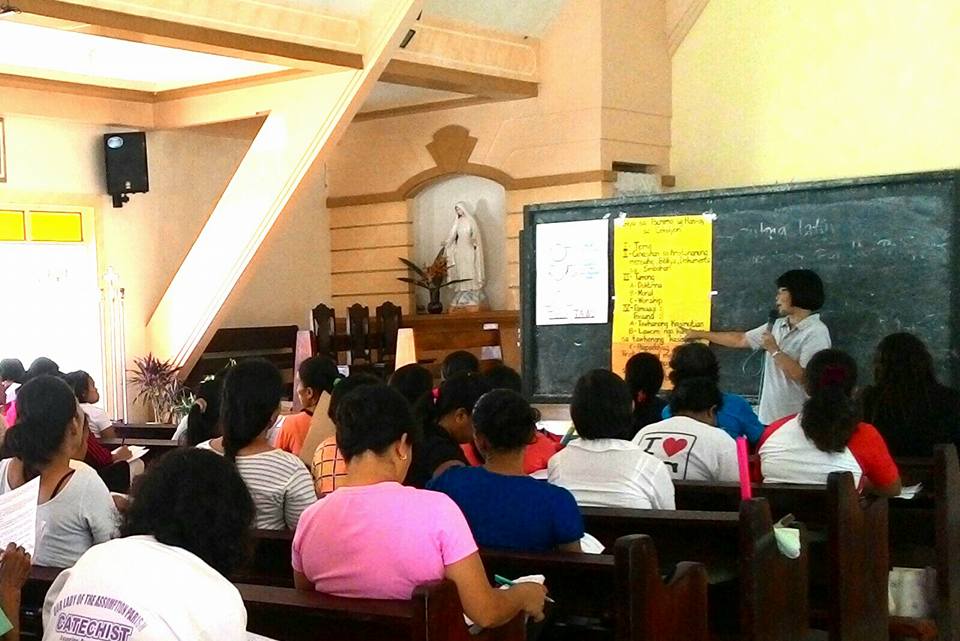
The diocese, or that portion of the people of God entrusted to the pastoral care of the bishop, plays the primary role of leadership and coordination in the catechetical ministry. Organizationally, almost every ecclesiastical territory in the Philippines has some sort of office (CCD, ORE, ORI, etc.) in charge of catechesis, to coordinate and support the catechetical work both within the diocese as well as with other neighboring dioceses.
Structurally, there is usually a diocesan pastoral council which assists the bishop with its consultative role in establishing a broad pastoral program for the whole diocese, including a general catechetical plan. (cf. Rev. NCDP, 473)
More specifically, it is the diocesan catechetical office which:
- analyzes the state of “education in faith” within the diocese, identify needs and develop appropriate plan of action with clear objectives;
- organizes and supports catechist recruitment, formation programs continuing education in seminars, and institutions of a specifically catechetical character;
- serves as information center for all involved in the catechetical ministry – helping them with catechetical aids and resources such as improved catechetical texts, model syllabi, instructional materials; etc.;
- improves personnel and material resources, conducts surveys on catechetical programs and their efficacy, the felt needs of parishioners and their religious attitudes;
- helps in evaluating present programs, especially their ability to integrate cognitive (doctrinal), affective (values and attitudes), and behavioral dimensions. (cf. GDC 266; Rev. NCDP, 474)
Bishops. The diocese represents the primary unifying and coordinating level of catechetical ministry. The key figure, of course is the bishop, who is “beyond all others, primarily responsible for catechesis” (CT 63). As the first catechist of the diocese, the bishop is to “let the concern to foster active and effective catechesis yield to no other care whatever in any way.” Rather he is to “take on… the chief management of catechesis… with competent and trustworthy assistants” (ibid.), to ensure effective priority for an active and fruitful catechesis, and adequate preparation of catechists. (GDC 223) In the Philippines, the bishop is frequently in close personal contact with the catechists of his diocese, yet with the growing numbers of the faithful and the increasing complexity of diocesan problems, he must rely on an active and efficient sub-structure which can offer real service to the parishes and BECs. The bishop’s role is to “bring about and maintain a real passion for catechesis, a passion embodied in a pertinent and effective organization which puts into operation the necessary personnel, means and equipment, and also financial resources” (ibid; cf CD 14; Rev. NCDP, 475)
E. THE RELIGIOUS
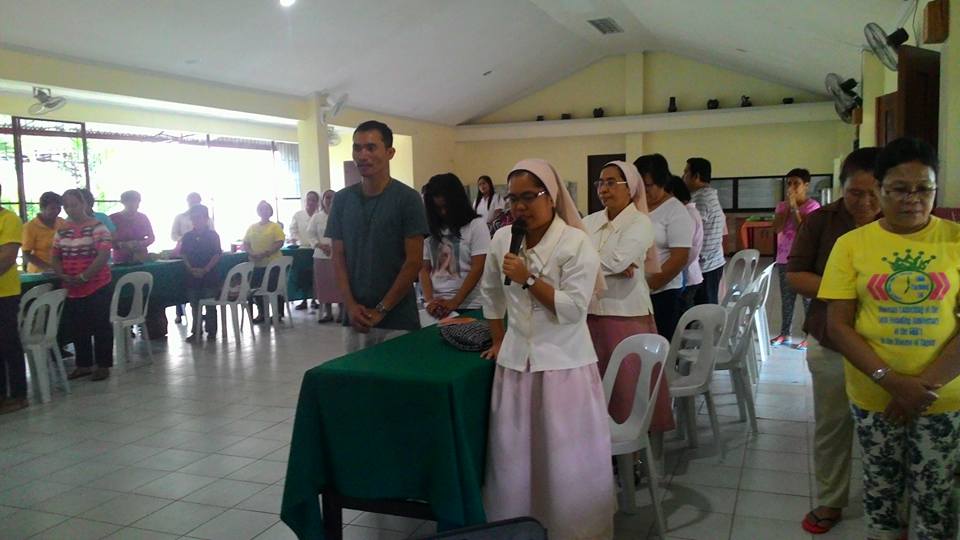
Religious congregations of both women and men provide significant pastoral support for the catechetical ministry and religious education. Historically, “many religious institutes for men and women came into being for the purpose of giving Christian education to children and young people especially the most abandoned.” (GDC 229; CT 65; RM 69) This gives hope that in following the charism of their founders, religious congregations in the Philippines will continue to develop greater collaboration with diocesan agencies and parish priests, as well as among themselves and their institutions, and thus enhance the catechetical work throughout the country. Various religious congregations could collaborate to produce various catechetical materials without entering into competition. When financial funds are scarce, a collaborative ministry can be very helpful in responding to the need of teaching tools, textbooks, and resource materials for catechesis. But such cooperation and collaboration will not materialize unless specific, concrete projects and programs are created which actively elicit such cooperative effort, and closer ties for the pastoral apostolate are developed between the bishops (the CBCP) and the associations of major religious superiors. (cf. Rev. NCDP, 476)
The Episcopal Commission on Catechesis and Catholic Education (ECCCE) then, is the Church’s catechetical agency on the national level, assisted by the Advisory Council for the Ministry of Catechesis (ACMC) composed of representatives from the various ecclesiastical circumscriptions, and from the catechetical centers based in Manila. (cf. Rev. NCDP, 477)
